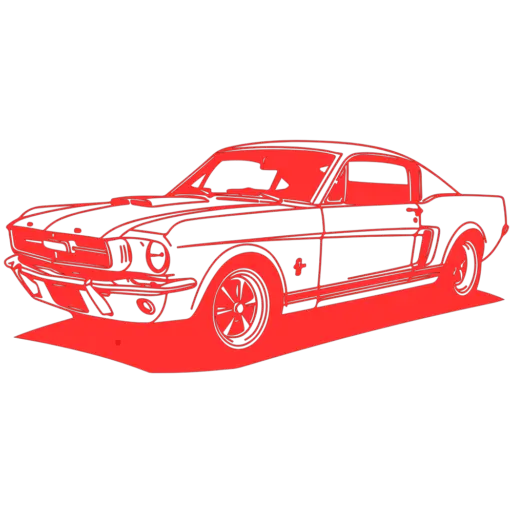Original or custom engine: The difficult decision for collectors (and why it kept me awake at night).
If I've learned anything over the years of collecting classic cars, it's that there's no more controversial or difficult decision than this: keep the original engine or go for something customized?
I'm telling you this because I've experienced the consequences of both elections firsthand. And I'm not exaggerating, okay? I've even spent sleepless nights thinking about it.
Imagine that old gem in the garage, the shine of the immaculate paint, the chrome gleaming in the sun, the carefully refinished seats… and when you turn the key, that perfect rumble – or not so perfect?
That's exactly where the question arises: original or custom engine?
I know how you feel now, as I, too, went through this dilemma a few years ago. I'm going to share my personal experience with you, along with some details that only those who have truly experienced it understand.
When preserving originality became my mantra
My first classic car was a 1967 Mustang. I remember the day I finally managed to buy it like it was yesterday. That roar of the original engine still sounds like music to my ears.
Preserving the original engine creates a unique sense of nostalgia. You turn the key and it feels like you've immediately stepped back in time.
But I confess that it is not always a bed of roses.
The original engine requires special care. Original parts can be difficult to find, expensive, and sometimes not as efficient.
And then there's the reliability factor. Let's face it: hitting the road in a classic with an original engine requires a certain amount of courage and confidence in the mechanics.
And it was precisely on one of these trips that I realized I needed to rethink my decision. I was stuck on a highway, with the whole family in the car, and the original engine signaling that maybe it was time to reconsider.
The day I decided to dare to personalize
After that frustrating experience on the road, I started researching custom engines.
And let me tell you one thing: the world of customization is fascinating!
Suddenly, I found myself immersed in a world of infinite possibilities.
I found modern engines perfectly adapted to older cars, offering greater safety, comfort, and, above all, driving confidence.
But don't think this decision was easy. I knew that by replacing the original engine with a custom one, I would lose some of the vehicle's original essence.
Originality is highly valued by the most purist collectors. And I admit I'm a bit of a traditionalist on this point, too.
Emotion versus reason in the custom engine decision
I spent weeks weighing the pros and cons until I realized something fundamental:
More than originality, what really matters is the experience and satisfaction you have with your classic car.
And you know what else?
When I finally put a custom engine in my classic Ford Mustang, I felt like I had given the car a new life.
It's become more powerful, reliable, economical, and safer. I was able to enjoy trips and outings with my family much more without worrying about possible breakdowns.
But I know you might be thinking right now, "What about the historical authenticity of my classic car? Won't that be compromised?"
And this is where another golden tip comes into play:
Make a reversible customization. In other words, carefully preserve the original engine. Keep it well packaged and stored properly, in case you ever want to return to the classic configuration.
Why does this decision affect the value of your classic?
Now let me tell you something very important about market value:
More traditional collectors prefer to invest in original 100% cars. For them, modifying them is almost like taking a piece of history with them.
On the other hand, there is a new wave of enthusiasts and premium investors interested precisely in the quality and exclusivity of customizations.
Cars with customized, efficient, and well-tuned engines have already begun to break records at specialized auctions around the world.
So, in practice, your decision can even increase your car's value in the future, as long as it's built with impeccable care and quality.
My golden tip on customization that few people talk about
In order not to lose historical value or damage your experience, I will share with you what I personally did:
I hired a renowned specialist to install a modern, efficient, and extremely quiet engine. Visually, it looked completely original from the outside, but when it came to accelerating, it was pure excitement.
This choice ensured that my car didn't lose its market value and also attracted attention (and good offers!) from premium advertisers who realized the value invested there.
And there is one more important detail in this whole story:
Choosing the right customization increased the visibility of my classic car so much that I ended up receiving invitations to exclusive events, opening doors I never imagined.
Can customization and originality coexist?
With my experience I assure you that yes.
If you do it with intelligence, technique, and respect for the vehicle's history, you'll have the best of both worlds: a true classic and modern performance that no one expects.
Today, my car attracts more attention than ever, and this has led to incredible friendships, valuable connections, and special invitations to exclusive events with premium advertisers.
And it's precisely this personalized, story-filled feel that sophisticated advertisers are looking for when they want to invest heavily in niche websites.
My last piece of advice: how to make the right decision
Think with me now: what do you care about when you get into your classic car?
Is it about preserving every historical detail or enjoying the pleasures of the road with greater safety and peace of mind?
Make a simple list. Evaluate your personal and financial goals, consider how much you plan to invest, and, most importantly, how you want to enjoy your car from now on.
If you opt for customization, be very careful when choosing the professional who will perform the service. Look for references and don't skimp, as quality generates appreciation and recognition in the market.
And of course, never forget to preserve the vehicle's original exterior features as much as possible. This makes a difference in its future appreciation.
Original or custom engine: what's your choice?
Ultimately, whatever your choice, you should know that collecting cars is, above all, a matter of passion and personality.
My experience with custom engines made me rediscover the joy of carefree driving, further increasing my love for classics.
Now it's up to you. Carefully evaluate your priorities and make the decision that will truly make you happy in the long run.
Because in the end, that's what's really worth it, right?
I hope my advice helps you make a more confident and enjoyable decision on this eternal question: stock or custom engine.
And may your choice bring you as much joy as it does me!
If you enjoyed this content, feel free to explore other articles here on the site. I'm sure you'll enjoy it a lot, especially if you're a classic car enthusiast like me.
+For you: Black plate: how I got mine for my classic cars

He's been passionate about classic cars for as long as he can remember. His story began in his grandfather's garage, watching the painstaking restoration of a 1957 Chevrolet Bel Air. It was in that space, amid the smell of grease and the stories told, that he discovered his love for old four-wheelers.

